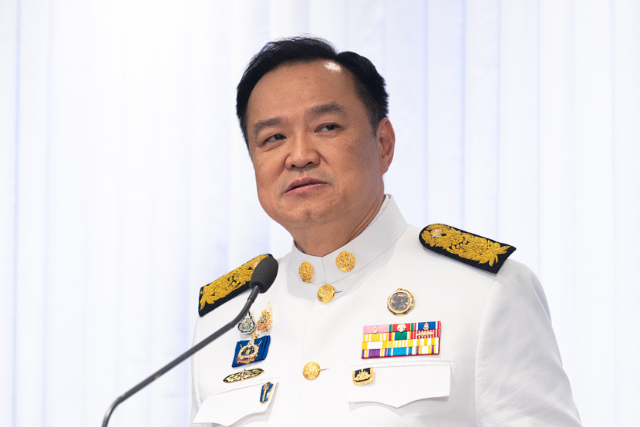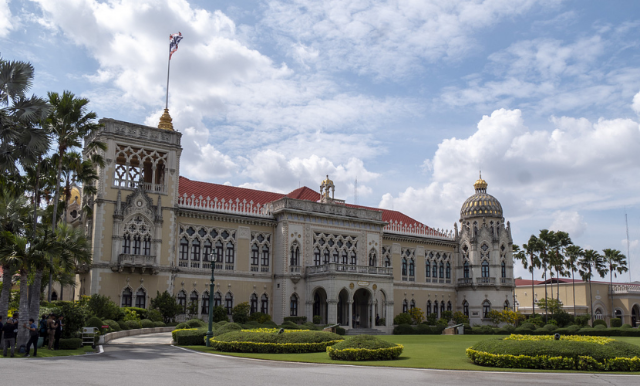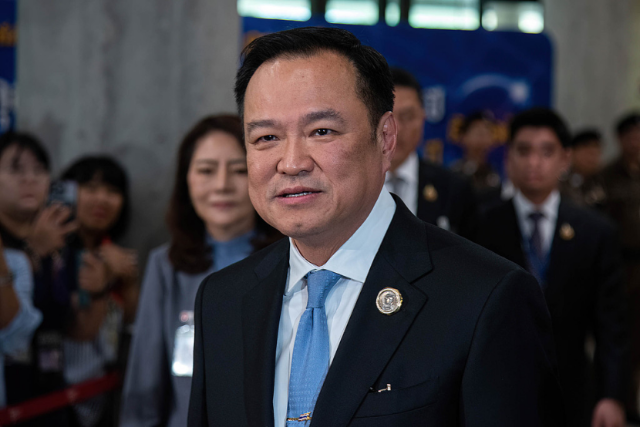
Anutin Charnvirakul attends a press conference at the Bhumjaithai Party's headquarters after the royal endorsement ceremony in Bangkok on Sept. 7, 2025. (Photo: CFP)
After King Maha Vajiralongkorn's endorsement paved the way for his tenure on Sept. 7, 58-year-old veteran politician Anutin Charnvirakul of the Bhumjaithai Party has taken office as Thailand's 32nd prime minister (PM). Prior to the endorsement, Anutin won a parliamentary vote exceeding the majority required for approval.
In a recent exclusive interview with Song Qingrun, a Professor in the Department of Asian Area Studies at Beijing Foreign Studies University, he told South that Anutin's victory represents a new outcome in the power dynamics of Thai politics.
His appointment as PM has temporarily stabilized Thailand's political status quo and is expected to contribute to the stable development of the Thai economy and society.
 Flags wave at Government House in Bangkok on Aug. 29, 2025. (Photo: CFP)
Flags wave at Government House in Bangkok on Aug. 29, 2025. (Photo: CFP)
What's behind Thailand's third PM in two years?
The frequent replacement of PMs is essentially a manifestation of Thailand's political fragmentation, stemming from the country's political and social diversity and the resulting complex multi-party power landscape, as analyzed by Song.
Currently, the Lower House of the National Assembly of Thailand has 500 seats, with 492 members serving. The People's Party holds 143 seats, making it the largest party in parliament, followed by the Pheu Thai Party with around 130 seats and the Bhumjaithai Party with about 70 seats.
No single party has the power to dominate politics, as Song observed. The People's Party holds less than 30% of the 500 seats in the Lower House. The Pheu Thai Party led the government in 2023 and 2024. The Bhumjaithai Party, which formed the cabinet this September, holds even fewer seats.
Song explained to South that, plagued by a multitude of political parties, Thailand lacks a dominant party or a figure with unparalleled clout. The long-standing rivalries between the ruling and opposition parties have led to numerous conflicts, resulting in chronic government instability.

Anutin Charnvirakul from the Bhumjaithai Party arrives at the parliament house in Bangkok on Sept. 5, 2025 (Photo: CFP)
New PM's arduous mission
Upon Anutin's appointment as the new PM, Thai stock and foreign exchange markets rallied, demonstrating the welcome of the business community and the aspiration for political stability among all sectors of Thai society.
Nonetheless, the new government, according to Song, will encounter a complex situation with challenges ahead.
On one hand, Anutin's government needs to focus on the tenets and interests of the People's Party regarding prickly issues such as constitutional amendments, which are contentious between the ruling and opposition factions. However, this largest political party insists on not joining the cabinet and not sharing government power. It remains to be seen whether the policy contract model can ensure government stability in the next four months.
On the other hand, after losing power and becoming the opposition, the Pheu Thai Party will constrain the new PM and the government's administration. Additionally, Anutin will grapple with economic and diplomatic issues.
Despite these challenges, "the Anutin-led government will implement multiple measures to stabilize the status quo and develop Thailand," Song noted.
The new PM has expressed his commitment to "work at my full capacity with honesty and morality," and his government will "work tirelessly" and dedicate themselves to their tasks due to the limited period of four months.
Song detailed Anutin's imperatives in the domains of politics, economy, society, and diplomacy.
Politically, the new government will likely prioritize coordinating between the ruling and opposition factions, easing the intensity of political infighting, and maximizing government stability.
In terms of the economy, the new government has already announced numerous policies for the coming months, such as promoting infrastructure development, expanding investment attraction, improving people's livelihoods, and enhancing public security.
Regarding foreign affairs, the new government will continue to cultivate goodwill with ASEAN countries and others. A priority will be tariff negotiation details with the US to mitigate challenges and enhance Thailand's international standing.

A couple poses for a selfie with their Pop Mart shopping bag at a Pop Mart store in Bangkok on July 21, 2025. (Photo: CFP)
Prospects of relations between China, Thailand and ASEAN
Given the 50th anniversary of the establishment of diplomatic relations between China and Thailand this year, the concept of the "Golden Year of Sino-Thai Friendship" not only summarizes historical cooperation but also provides a value orientation for future bilateral relations.
Song identified three fields for future collaboration between the two sides: politics, infrastructure, and cultural exchanges.
At the political level, Anutin is expected to continue enhancing interactions with China and participate in celebrations marking the 50th anniversary of diplomatic ties to further strengthen bilateral relations.
Regarding infrastructure, he will facilitate the process of the China-Thailand High-Speed Railway and foster cooperation in key areas such as the digital economy and the new energy vehicle industry chain.
As for cultural exchanges, the new PM will prioritize attracting tourists from China to Thailand to boost the economy and strengthen people-to-people bonds. Notably, he is expected to work with China and other countries to combat regional telecom fraud and its derivative crimes to address security concerns related to traveling to Thailand.
As Thailand is ASEAN's second-largest economy, deepening China-Thailand comprehensive cooperation will inject new impetus into China-ASEAN relations, as Song emphasized.
He cited the China-Thailand railway cooperation as a prime example. If the project continues to advance, the future China-Laos-Thailand railway will serve as a further international golden corridor.
Once completed, the China-Laos-Thailand Railway, if extended through southern Thailand to Malaysia and Singapore, will form a multinational regional transportation line. Simultaneously, China is also in discussions with other ASEAN countries such as Vietnam and Myanmar on cross-border railway construction to further improve the pan-Asia rail network.
In the long run, the China-Laos-Thailand Railway and its extension will promote connectivity and personnel exchanges between China and ASEAN. The envisioned transportation network, in Song's view, will boost the development of the China-Indochina Peninsula Economic Corridor, the New International Land-Sea Trade Corridor, and the Lancang-Mekong sub-region.
Reporter: Zhang Ruijun
Editor: Yuan Zixiang, James Campion, Shen He
















